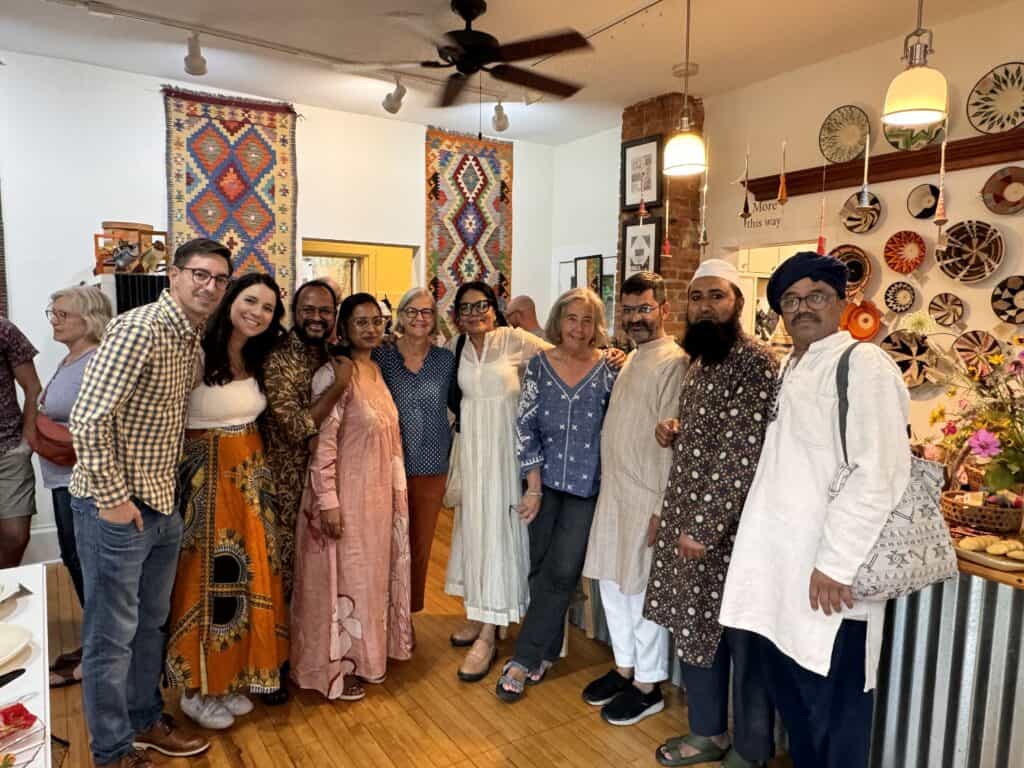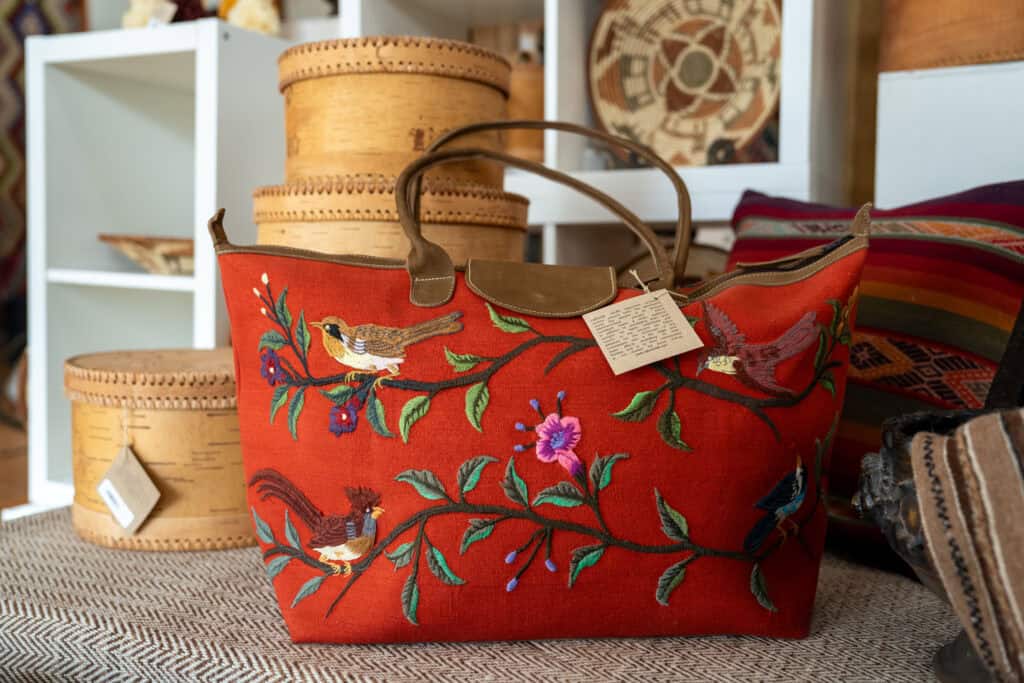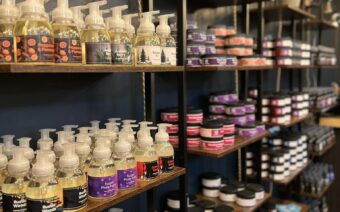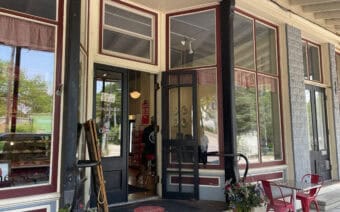
March 17, 2025
MAIDEN ROCK – When husband/wife team Angélica Sanchez and Daniel de la Concha saw that Cultural Cloth (located at W3560 WI-35 in Maiden Rock) was up for sale last year, the duo – who currently live in Milwaukee – said it was an opportunity they couldn’t pass up.
Home to handcrafted items from artisans in more than 40 countries around the globe, Cultural Cloth was founded by Mary Anne Wise and Jody Slocum more than 15 years ago.
Inspired and intrigued by the business Wise and Slocum built, Sanchez said she and de la Concha traveled from Milwaukee to Maiden Rock to see the shop for themselves.
Sanchez said the store was “fascinating at first sight” to both her and de la Concha.
“We met (Wise and Slocum) in April of last year, when we started the process (of transitioning over ownership) and began talking about how we can make this work,” she said.
A learning curve
As the new owners, Sanchez said she handles the day-to-day duties full-time at Cultural Cloth, with de la Concha supporting the venture behind the scenes, overseeing the operations side of the business.
New to entrepreneurship, Sanchez said there’s been a curve to learning the ins and outs of running a business.
“We went through the business loan process, which was a big learning curve as this was my first time in business ownership,” she said. “I was so excited that we were able to make it happen.”
Though the artistry behind the merchandise is what first drew her to Cultural Cloth, she said the retail side of the business came naturally to her due to her experience in retail and customer service and from her minor in business.
“A lot of those administrative skills come in handy when managing a budget, overseeing timelines and working with staff and our artisan partners,” she said.
Understanding business loans and taxes, Sanchez said, are the aspects of business ownership that came with a bit of a learning curve for her.
“Fortunately, we have found that you just need to find the right people who can help you with that knowledge,” she said. “That is what we’ve been doing – connecting with people that know what they’re doing and getting their advice. We are learning on our own as well.”
A deep-seated passion
Sanchez said her love for global artisanship runs deeply.
“I’ve traveled quite a bit, especially in the global south,” she said. “There’s just something that really calls me from that area. As I traveled around, I saw all of these beautiful artists and their beautiful work, mostly made by women. They have the talent. And for them, selling it creates such a challenge.”

Sanchez said she realized she could make a difference by creating a pathway from artisan to consumer.
Spending more than 10 years working in the nonprofit sector in conservation and environmental science as director of Urban Ecology Center in Milwaukee, Sanchez said her work centered around connecting people with nature and protecting urban green places.
“I’ve always really been interested in the social side of science and how the environment and people interact,” she said. “You can’t have one without the other. That’s how it aligns to me.”
As she traveled around the globe – during college, for work and on vacation – Sanchez said her experiences were very formative.
“When I was in college, I did some agriculture and forestry research in eastern Kenya,” she said. “But what was really interesting to me is how the women were taking the resources they had around them, including beautiful sisal baskets, and trying to sell them for their livelihood. Throughout my life, even though I didn’t fully know it, I was (being guided) toward this theme of conservation from enterprise.”
Sanchez – who grew up in Mexico, moving to the United States at 12 years of age – said she started noticing at a young age how important it is for women around the world to have that source of income.
“I remember when I was quite young, I would want to sell candy in order to buy something,” she said. “I am always thinking, ‘how can I make something work?’”
Sanchez said she is seeing that same resourcefulness among the artisans featured at the Cultural Cloth.
She said the store works with artisans from all over the world who weave, quilt, embroider, stitch, knot, hook, bead, print and dye handmade home goods and accessories.
An intentional focus
Sanchez said Cultural Cloth is very transparent in terms of what the store does.
“We want to give very equitable wages and percentages for our products,” she said. “We are very mindful of that. We are also mindful that we are a business, and in order for (our featured artisans) to succeed, we also need to succeed.”
Keeping both of those things in mind, Sanchez said Cultural Cloth is very intentional with its pricing.
“Customers will ask if we ever run sales or discount our items,” she said. “We never run an end-of-season sale, because we don’t raise our prices in order for us to discount them… It is a very meaningful work, and it’s very impactful. I hope that customers can see and realize it as well. The money that the artisan makes goes directly back to them.”
One way Cultural Cloth is able to help customers appreciate the store’s featured artisans, Sanchez said, is through storytelling.
“Customers love being able to look at a piece and appreciate its history,” she said “Our price tags say a little bit about the story, about the artist or the group that we got the item from. Customers can look at a piece, feel it, touch it and understand where it came from and who made it. That really adds value.”
Though 20% of Cultural Cloth’s revenue comes from online business, Sanchez said many travel to Maiden Rock just for the experience the store provides.
“We have a very colorful store,” she said. “People come in for the colors and warm atmosphere in order to get a break from winter. We have customers visit us from the Twin Cities because of our location.”

Within the walls of the store, Sanchez said customers can travel the world without leaving the state.
“We work with more than 40 different countries,” she said. “We hear things like, ‘I went there when I was younger.’ It’s a reminiscent journey for folks who have traveled to many of these places. I think it’s part of the experience when they buy a piece – it’s more meaningful.”
In addition to featuring their products at Cultural Cloth, Sanchez said they also mentor the artisans – offering feedback and coaching them on how they can make their products even more marketable.
“For example, if we’re working with a group that is making quilts, we may (suggest) specific sizing,” she said. “Or maybe we need it to be finished in a certain way, or for it to be at a certain thickness. It’s almost like developing the product in a way that we know will be more marketable in the U.S., while still maintaining the cultural relevance to where it’s being made.”
Sanchez said they will also sometimes discuss the color of products.
“An artisan may feel red, yellow and blue (would be best), but we may coach them by suggesting mustard or indigo,” she said. “We try to identify things that we know are going to translate well to our customers.”
Sanchez said they believe that by offering feedback, artisans can also sell those products to others as they continue to build their sustainable businesses.
“We always say ‘we don’t want to be their only customers,’” she said. “We want them to be successful even without us.”
Like any business, Sanchez said the current economic tempo plays a role at Cultural Cloth – especially with the uncertainty with imports and exports.
“That is definitely something we are tracking and managing,” she said. “We are trying to better understand how this volatility is impacting our work right now.”
Then, Sanchez said, there are the everyday challenges of running a business.
“A lot of our pieces are décor or accessories and things that are not necessities,” she said. “Customers will think of that first. They will cover their necessities first. That certainly impacts our work as well.”
However, at the end of the day, Sanchez said “we believe in our mission.”
“We just want people to come in and value the handmade pieces, and help them understand the hours that go into making every piece and the talent behind it,” she said. “We love that customers can understand that. There might be a scarf that has 200 hours of stitching, and you might not know that. It just puts the value of work and value of the people behind the work into perspective. We love that we can share that.”
Sanchez said business is fairly steady throughout the year, with a peak around the Christmas holiday.
As the pair approaches its first year as owners of Cultural Cloth, Sanchez said they are already thinking about the future – which includes plans to open a second location in Whitefish Bay.
Visit culturalcloth.com for more information.
 New North Summit showcases ‘the power of collaboration’
New North Summit showcases ‘the power of collaboration’ Bellin’s Casey honored with WACEP Distinguished Service Award
Bellin’s Casey honored with WACEP Distinguished Service Award








